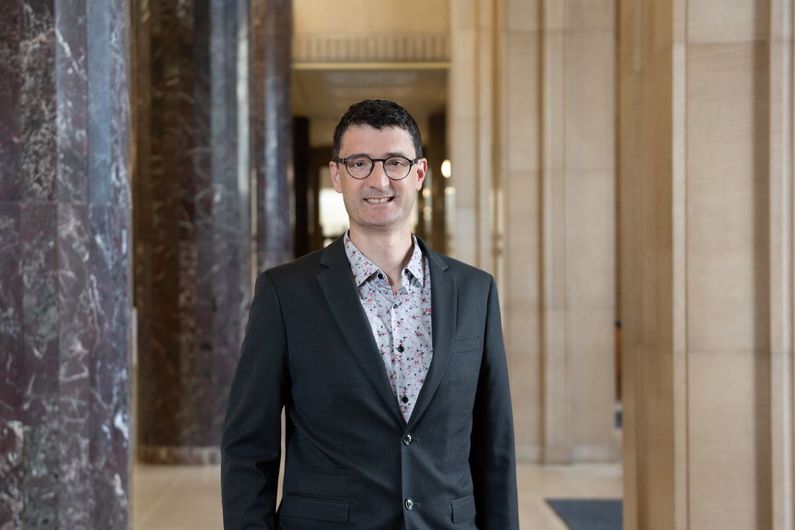UdeM’s veterinary training program welcomes its first students in Rimouski
- UdeMNouvelles
08/26/2024
- Martin LaSalle
David Francoz, dean of the Faculty of Veterinary Medicine, discusses how the new doctoral program of 24 students aims to improve access to care in rural Quebec.
Université de Montréal is addressing the growing problem of access to veterinary care in Quebec’s outlying regions with a new veterinary training program now launching in Rimouski.
A collaboration with Université du Québec à Rimouski (UQAR), the program is set to welcome its first cohort of 24 students this week. The goal is to train a generation of versatile veterinarians capable of meeting the varied needs of the rural communities they serve.
David Francoz, appointed dean of the Faculty of Veterinary Medicine in 2023, sat down with us to talk about the origins of the project, his vision for the program and the challenges involved.
Where did the idea of offering a decentralized program in veterinary medicine come from?
It started with Christine Theoret, who became dean of the faculty in 2018. There was already a problem with access to veterinary care at that time, especially outside the major urban centres. This was, and is, an issue that extends far beyond Quebec’s borders.
The idea occurred to Theoret that summer as she was driving her daughter to Saguenay to attend the graduate program in physiotherapy offered by McGill University in partnership with Université du Québec à Chicoutimi (UQAC). After seeing firsthand how that health sciences partnership works and how successful it’s been, she thought of doing the same thing at UdeM’s veterinary medicine program.
Theoret discussed it with then-UdeM rector Guy Breton and officials at Quebec’s Ministry of Agriculture, Fisheries and Food (MAPAQ), who were all receptive to the idea.
By the way, after Theoret’s daughter completed her physiotherapy degree, she decided to stay and practice her profession in the Saguenay area. It’s an example of how relocating university programs away from major cities can help strengthen the regions.
How did the partnership with UQAR come about and why did you choose UQAR?
Our objective was to meet regional veterinary care needs and this coincided with MAPAQ’s initiative to identify regions with inadequate access to veterinary care for farm animals.
To decentralize our program, we had to make sure our students and teaching staff would have access to the services they needed to meet the requirements of our accrediting body, so it was important for us to work with an existing university structure.
And since the Lower St. Lawrence is a major agricultural area and home to the Cégep de La Pocatière, which is not far from Rimouski, we saw the potential for future collaborations in research and expertise that would complement our own. So it was natural for us to join forces with UQAR.
What do the latest data on access to veterinary care in rural Quebec show, and how can we address this issue?
It’s important to mention that in 2018 the problem of access to veterinary care concerned mainly farm animals. However, now it’s a problem with companion animals too, and this is especially true in outlying regions.
This is why we are focusing on providing more versatile training for our students. So, in the Rimouski program, we are reserving 12 spots for students taking the farm animal option and 12 for the regular option.
To meet society’s needs, especially outside the major urban centres, we have to train “mixed-profile” veterinarians who have the skills and interest to care for more than one species. This will help improve access to care and also promote resilience in the profession and continuity of services.
In addition, students from outlying areas who apply to the Rimouski program will have the advantage of seeing their R scores increased based on the needs in their home region, as determined by MAPAQ.
Will teaching be done exclusively by UdeM professors or will some courses be given by UQAR professors?
Since this program confers a Doctor of Veterinary Medicine degree from UdeM, the teaching staff are all from UdeM. The majority are professors, clinicians or lecturers in veterinary medicine who already work for our faculty or are newly hired.
However, UQAR teaching staff could take part in teaching in some specific areas in which they have expertise. We’re currently working out agreements to this effect.
Where will the infrastructure to accommodate the students in this new program be located?
For this first year, the students will occupy an entire floor of UQAR that has been renovated to accommodate them.
Construction of a new building is also underway, under the responsibility of UQAR. I should mention the incredible collaborative relationship we have with them. We have found UQAR to be the perfect partner for setting up this decentralized program.
Construction of the new building is supposed to be completed in summer 2025 and it’s on schedule. But if there are any delays, we will have a contingency plan in place to welcome the second cohort of students in fall 2025.
Does the Faculty of Veterinary Medicine have any other plans for its decentralized program in Rimouski?
Initially, the idea was to set up a Doctor of Veterinary Medicine (DVM) program but we are already working on adding graduate programs in the future. We have held various networking activities to promote collaborations with UQAR researchers, which have led to some joint projects. We already see great synergy developing in a number of areas, such as projects involving aquatic or northern animals, and there will be more to come.
More generally, UdeM and the Faculty of Veterinary Medicine intend to become actively involved in the Rimouski community and throughout the region, particularly with veterinary clinics and farmers. We are planning a number of networking activities.












